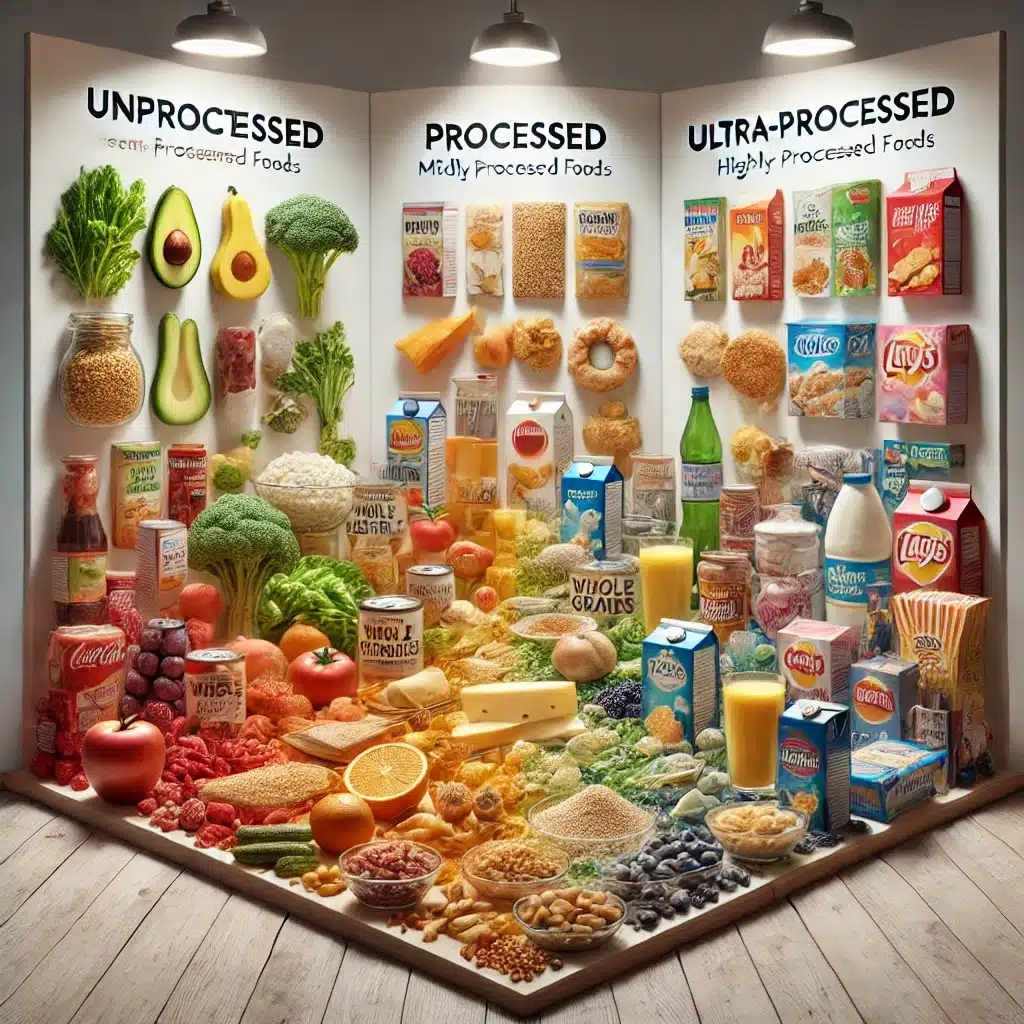
Approx. read time: 6.3 min.
Post: The Impact of Ultra-Processed, Processed, and Unprocessed Foods on Our Body and How to Make Healthier Choices
Choosing Healthier Foods to Prevent Chronic Illness. In the modern world, our daily diets include various types of foods ranging from fresh, unprocessed items to highly manipulated, ultra-processed products. These food categories—unprocessed, processed, and ultra-processed—play distinct roles in our health and well-being. As convenience foods become increasingly popular, understanding these categories and the impact each has on our body is crucial to making informed dietary choices. This article delves into the differences between ultra-processed, processed, and unprocessed foods, their effects on our body, and practical ways to prevent diet-related ailments through smarter food shopping.
Types of Foods: Unprocessed, Processed, and Ultra-Processed- Choosing Healthier Foods to Prevent Chronic Illness
1. Unprocessed Foods
Unprocessed foods are natural and have not been altered. They include fruits, vegetables, grains, eggs, and raw nuts. These foods keep their nutrients, fiber, and natural enzymes, making them rich in essential vitamins and minerals. Since they are in their natural form, they are healthy and satisfying without providing extra calories.
Eating unprocessed foods boosts our health and reduces the risk of many diseases. This category is linked to lower rates of obesity, heart disease, and diabetes.
2. Processed Foods
Processed foods are changed from their natural state, often for preservation or taste. This processing may include canning, freezing, drying, or adding seasoning. Examples include canned fruits, yogurt, frozen vegetables, and cured meats. These foods are convenient, and some still offer nutritional benefits.
However, processed foods often have added sugar, salt, or preservatives. Choosing them carefully can help you avoid excess additives and unhealthy fats.
3. Ultra-Processed Foods
Ultra-processed foods are highly changed from their original form. They include artificial colors, flavors, and chemicals to extend shelf life or improve taste. Examples are sugary cereals, soft drinks, packaged snacks, and fast foods. These items are convenient and often affordable, but they usually contain high amounts of salt, sugar, and fats.
In terms of nutrition, ultra-processed foods provide little more than extra calories. Eating too many of these foods can lead to weight gain, high blood sugar, and increased risk of diseases like diabetes and heart disease.
How These Foods Affect Our Health-Processed-Choosing Healthier Foods to Prevent Chronic Illness
1. Benefits of Unprocessed Foods
Eating unprocessed foods supports both physical and mental health. The main benefits include:
- Better Digestion: High fiber levels in unprocessed foods aid digestion and promote a healthy gut, which helps immune function and mental wellness.
- Lower Inflammation: Foods like fruits and vegetables are full of antioxidants that reduce inflammation, lowering the risk of chronic diseases.
- Stable Energy: Unprocessed foods help maintain steady blood sugar levels, which gives you energy throughout the day.
- Heart Health: Whole foods, such as leafy greens and whole grains, help reduce blood pressure and cholesterol, which benefits heart health.
2. Processed Foods: Pros and Cons
Processed foods can be both helpful and harmful, depending on the choices you make. Some of the impacts include:
- High Sodium Content: Many processed foods contain a lot of salt, which can raise blood pressure and increase the risk of heart disease.
- Additives and Preservatives: Some preservatives may disrupt gut health or trigger allergies in sensitive people.
- Moderation Is Key: When eaten in moderation, processed foods like yogurt or canned beans can still be healthy choices. They provide nutrients but have fewer additives.
3. Risks of Ultra-Processed Foods
Ultra-processed foods are linked to several health problems, mostly due to their high sugar, salt, and fat content:
- Obesity Risk: Ultra-processed foods are calorie-dense but lack nutrients, which often leads to overeating and weight gain.
- Insulin Resistance and Diabetes: Sugary and refined foods can cause insulin resistance, leading to type 2 diabetes over time.
- Heart Disease: Trans fats, high salt levels, and preservatives in ultra-processed foods can raise cholesterol and blood pressure, increasing the risk of heart problems.
- Digestive Issues: Ultra-processed foods are low in fiber and high in artificial ingredients, which can disrupt digestion and harm gut health.
- Mental Health Impact: Eating these foods may contribute to higher rates of depression and anxiety due to blood sugar swings and inflammation.
Reducing Health Risks by Choosing Better Foods
Making healthier food choices can reduce the risk of diet-related health issues. Here are some tips for avoiding ultra-processed foods and opting for healthier alternatives:
1. Read Food Labels
Labels provide essential information. Look for:
- Short Ingredient Lists: Foods with only a few ingredients are usually less processed.
- Avoid Artificial Ingredients: Choose foods without artificial colors, preservatives, or high-fructose corn syrup.
- Check for Added Sugars and Salt: Many processed items have hidden sugars or salt. Look for options with lower levels of these additives.
2. Shop the Store’s Perimeter
The edges of the grocery store usually stock fresh produce, dairy, and meats. Starting your shopping in these sections can help you make healthier choices.
3. Choose Whole Grains
Whole grains, like brown rice, oats, and whole-wheat products, are healthier than refined grains. They provide long-lasting energy and improve digestion with their high fiber content.
4. Cook Meals at Home
Making meals from scratch gives you control over ingredients and portion sizes. By cooking at home, you can avoid unnecessary additives found in pre-packaged meals and include more fresh foods.
5. Add More Fruits and Vegetables
Filling half your plate with fresh produce is a simple way to add more vitamins, minerals, and antioxidants to your diet. This also helps limit the desire for ultra-processed snacks.
6. Pick Natural Snacks
Natural snacks, like nuts, seeds, and fresh fruit, are nutritious and can satisfy hunger. They provide healthy fats and proteins, keeping your energy stable without added sugars.
Real-Life Food Swaps for Better Health
Making small, practical changes can improve your health over time. Here are a few easy swaps to consider:
- Replace Sugary Cereals with Oatmeal: Instead of starting your day with a sugary cereal, try oatmeal topped with fruit or nuts. This adds fiber and nutrients, giving you steady energy.
- Choose Fresh Chicken Over Deli Meats: Deli meats are often high in sodium and preservatives. Cooking a fresh chicken breast instead can reduce salt intake and avoid additives.
- Switch Soda for Sparkling Water: Soda contains empty calories and lots of sugar. Try sparkling water with a squeeze of lemon or fresh fruit for a refreshing alternative.
- Make Sauces at Home: Store-bought sauces often have added sugar and preservatives. Making a simple sauce with fresh tomatoes and herbs allows you to skip the additives.
Conclusion-Choosing Healthier Foods to Prevent Chronic Illness
Our food choices play a big role in our health. Knowing the differences between unprocessed, processed, and ultra-processed foods is the first step to making better choices. Unprocessed foods provide valuable nutrients, processed foods can be useful when chosen carefully, and ultra-processed foods should be limited due to their health risks.
By choosing whole foods, checking labels, and cooking at home, you can reduce your risk of chronic disease and improve your health. Small changes in how you shop and eat can lead to big improvements, helping you feel better and live a healthier life.
Related Videos:
Related Posts:
The U.S. Ban on Brominated Vegetable Oil: An In-Depth Analysis
The Vital Importance of emotional and physical health
How the Food We Eat Today Is Making Us Sick: What Food Companies Aren’t Telling Us
Computers mine online reviews for signs of food poisoning
Exploring the Flavors of Lebanon: A Guide to Traditional Lebanese Dishes
Understanding Sugar Cravings: Causes, Impacts, and Solutions










